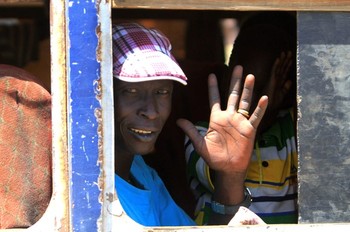N. Bahr el Ghazal seeks return of over 26,000 natives stranded in Khartoum
April 25, 2013 (JUBA) – South Sudan’s Northern Bahr el Ghazal state is seeking assistance to facilitate the return of over 26,000 people who officials say remain stranded in the Sudanese capital Khartoum.

Deng Kuel Kuel, head of South Sudan’s Relief and Rehabilitation Commission (SSRRC) branch office in the state said on Wednesday that the International Organisation for Immigration (IOM) has helped more than 169 internally displaced people return to their homes in South Sudan.
“The International Office for Immigration has helped return 169 people today from Malakal town in Upper Nile State. They were brought in two trips today. The first trip brought 85 and the second brought 84, making the total of 169 people who have been assisted to return to their home area after several years away as a result of war. We are also expecting others to be returned as the total number of people waiting to be assisted to return from Malakal is 317”, Kuel told Sudan Tribune in an interview on Wednesday from Aweil town, capital of the state.
“Over the past four months, the commission through partners has moved a lot of people from different states including Northern Bahr el Ghazal out of Renk after being assisted to return to the country by the African inland Church but we still have people currently stranded. They want to come home. In Khartoum alone and its surrounding areas, we have 26,000 people from Northern Bahr el Ghazal who need to be assisted to return home. They have shown willingness but the problem is that our hands are tied by the austerity measures”, he said.
Initially after the signing of the 2005 people agreement people were reluctant or slow to return due to the widespread presence of landmines and unexploded ordnance, as well as extensive damage to infrastructure. In many cases people also wanted to see more evidence of improved security. However, after de-mining by the government and other improvements in security more families returned but a significant number remained hoping that the country would not split.
“Currently, the challenges include widespread damage to property and infrastructure, a still fragile security situation and patchiness in provision of public services,” said Kuel.
“Continuing international support and stable security will be essential for returns to become sustainable, and particularly if internal displacement due to tribal conflict is to be brought to an end during 2013.”
Kuel said United Nations World Food Programme is one of the agencies responding to IDP and returnees needs with distribution of the three months rations to help them start a new life as they try to settle and reintegrate into the communities. Other agencies with international relief organisations are also providing shelter repair kits and non-food items packages to people.
These packages include blankets, kitchen sets, plastic sheeting and tools.
(ST)
